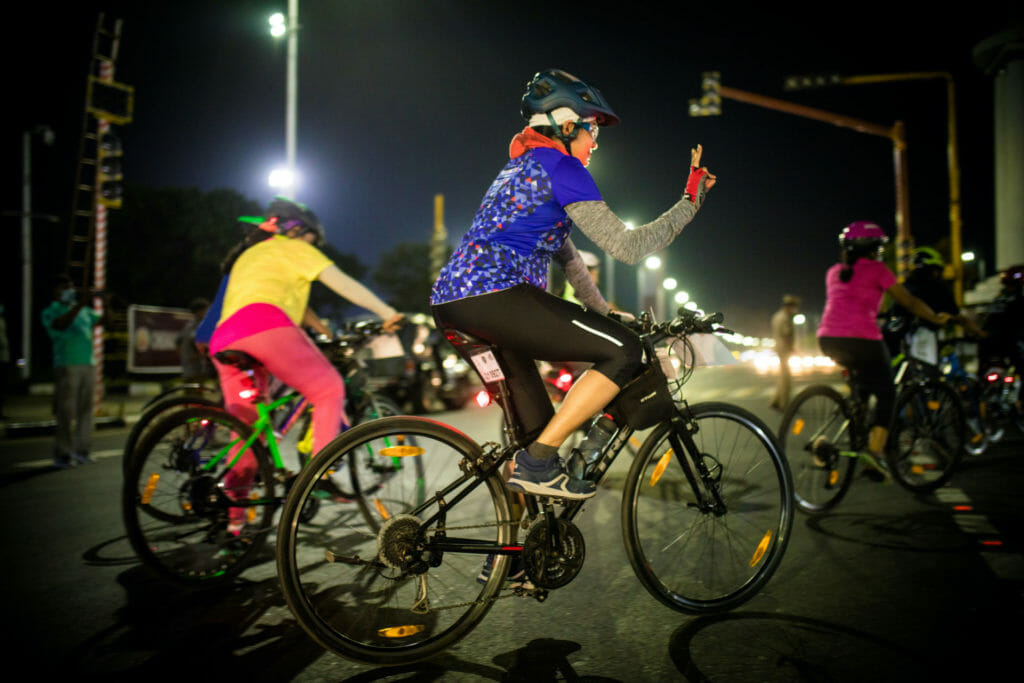In the sweltering Chennai summer heat, Amala endearingly helps her friend Pavithra who is fretting and nervous about riding a bicycle through the busiest roads of Arumbakkam. To add to her stress, the ordeal is unfolding at 9 pm, a time highly unusual for women to commute casually in Chennai.
While Pavithra anxiously pedals, constantly shifting uncomfortably in her seat, with several eyes watching her every move, Amala and her friends join Pavithra in solidarity. They cheer her on, as she slowly and gradually adjusts her eyes to the dizzying traffic and steadies herself to a comfortable pace.
Cycling in the streets of Chennai at night
Pavithra and the group are joined by other enthusiastic women from various zones in the city and the ride ends at the Pondy Bazaar pedestrian plaza located at the heart of Chennai. The women cyclists along with other pedestrians and onlookers get together to sing songs, make merry, and celebrate the Saturday night.
These were some of many warm moments witnessed by the city of Chennai on the night of May 28 as the City’s Corporation facilitated a night cycling event to encourage women to assert their right to the city. The ride was led by the 28-year-old dynamic Mayor of Chennai, Priya Rajan, and had participation from hundreds of women including senior officials of the Corporation.
Read more: How friendly is Chennai towards women cyclists?
Chennai, a contemporary and vibrant cosmopolitan metropolis with a colonial legacy and rich Tamilian traditions, has typically leaned towards the conservative end of the pendulum, particularly in matters of women’s mobility. From everyday conversations with domestic workers to college students to city councillors, we understand that unmediated access to public spaces is absent for most women.
“I am always on the move and I also see other women always on the move here.”
“My dressing is analysed and my character is accordingly judged when I step out.”
“My perception of safety at night is that it is unsafe.”
“I feel like I am being followed.”
While one can see active economic participation by women in the city, from the street vendors in Tondiarpet to the stream of lawyers outside Madras High Court, the idea of lone loitering is still missing.
While it is important for city officials to promote women and individuals from gender and sexual minorities who generally lack visibility, to use the public facilities, it is equally important for the practice of women cycling to simply be present without a plan or ceremonials to become the daily norm. Now how can an Indian city like Chennai internalise and accommodate women who want to be mobile at any given point without a care in the world?
Women’s right to Chennai city
Women’s mobility has always been under scrutiny in Chennai. She is observed, stared at, and studied as she commutes from home to school, work to park, beach to bus stand, wedding venue to funeral home, grocery shop to Mars! This inspection forces girls and women to stick to familiar terrain and adhere to only the most comfortable routes while commuting.
The story is grimmer for women who do not belong to the dominant narratives of caste, class, gender, and physical abilities. The option of strolling alone in unfamiliar neighbourhoods is almost always stolen from the women and girls under the protectionist pretence of safety. They find private spaces within public spaces to remain hidden or invisible.
It has been more than a decade since the book ‘Why Loiter’ captured Indian hearts and minds and launched a series of conversations on women’s safety and their access to public spaces. Any individual who identifies as a woman always has to demonstrate their reason and purpose for being in the public to garner agreement in the eyes of the community.
The research undertaken by the authors elucidates how women do not have equal access to spaces as men. In order for women to maximise their access to common areas as citizens, surveillance and a protectionist attitude are not what is required but simply the unconditional right to these places.
So the question is how can women have unrestricted access to public spaces without any masquerades or pretences?
Read more: Gender and Policy Lab to work towards a safe and inclusive Chennai
Role of the Gender and Policy Lab
While evidently there are necessary requirements for friendlier infrastructure and services to support this shift in culture, it will take tremendous efforts to bring forth such a change in behaviour and attitude. The Gender and Policy Lab housed within the Greater Chennai Corporation, the oldest Urban Local Body in India, is hoping to create this much-needed change with the support of government departments, community-based organisations, and the citizens.
Supported by the Nirbhaya Fund, the Gender and Policy Lab was established as part of the Chennai City Partnership between the World Bank and the Government of Tamil Nadu. One of the focus areas under this partnership is to improve the safety of women and girls in public spaces and to make public transport more gender inclusive.
The Lab will assist the implementing agencies in carrying out projects to meet this objective. There will also be campaigns similar to the cycling ride to encourage women and individuals from gender and sexual minority communities to claim their right to the city. The idea is for a simple cycle ride to steer the necessary ripple effect for bigger occupation and public infrastructure and services usage.
Here’s hoping the coming months see a wave of cultural change with women taking to the streets and simply meandering because they can!
